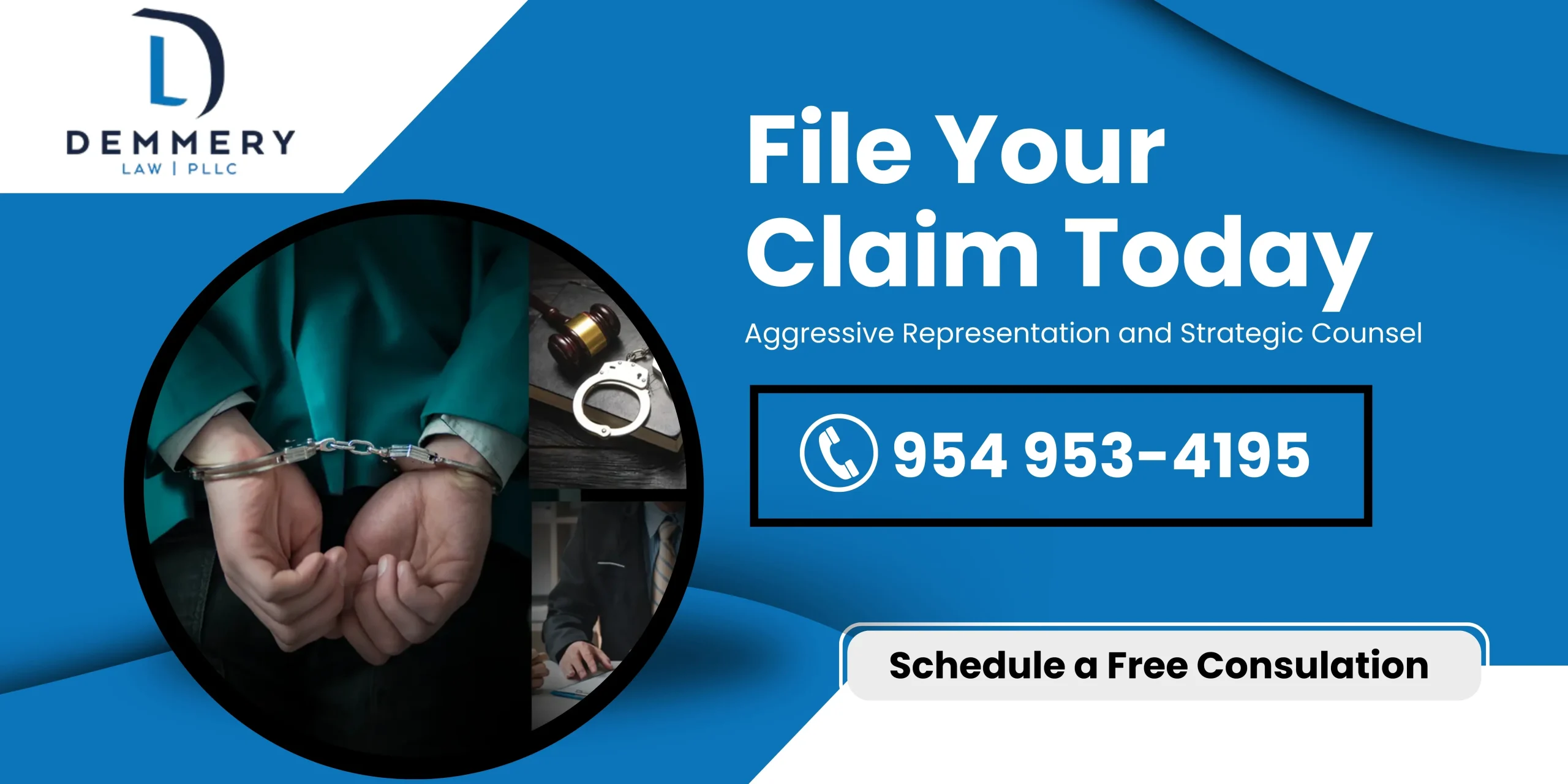Margate Criminal Defense Lawyer
Margate Criminal Defense Attorney
There are a plethora of criminal charges that a person may face. Each one has different consequences, depending on the nature and severity of the offense. Regardless of the crime you are being charged with, it is extremely helpful to have a Margate criminal defense lawyer fighting for you.
An experienced criminal defense lawyer from Demmery Law can do more than represent you in court; they can also work hard beforehand to build a strong defensive case and prepare you for potential outcomes. If you are thinking about hiring a lawyer, know that doing so can make a great difference in your case.

Classifications of Crimes
A variety of acts are considered illegal and can be tried criminally in a court of law. These range from minor offenses to violent, devastating actions. Because of this, crimes are generally sorted into two categories: misdemeanors and felonies.
Misdemeanors are less serious offenses that do not cause extensive harm to anyone or their property. While they may result in jail time or small fines, they often do not have great consequences for the victim. Therefore, the courts do not usually impose any life-altering ramifications on someone who is found guilty. Some examples include:
- Vandalism
- DUI
- Shoplifting
- Marijuana possession (in smaller portions)
- Minor battery
- Public intoxication
Felonies are considered serious crimes. Oftentimes, perpetrators have significantly harmed someone or their property. Consequences for felonies include time in prison and hefty fines. There are other potential life-long implications, such as not being able to vote or own a firearm. Some examples are:
- Homicide
- Murder
- Rape
- Violence involving minors
- Drug trafficking
- Grand theft
Criminal Consequences and Florida’s Point System
Consequences for being convicted in Florida depend on whether you were found guilty of a misdemeanor or a felony. However, they are also determined by using the criminal point system outlined in the Criminal Punishment Code. This scoring tool breaks down felonies by severity and decides if an individual should spend time in jail.
There are ten levels of felony offenses, with each level having a corresponding point value. In some cases, a judge may grant a less severe sentence than what the points require if there are extenuating circumstances, such as if the defendant:
- Is a minor.
- Is a first-time offender and shows extreme remorse.
- Did not have the capability to understand their actions.
Ongoing Penalties of Felony Convictions
If you are convicted of a felony, you may face consequences beyond prison time and fines. The conviction will be on your record, so future employers and contacts can see it. Additionally, someone convicted of a felony may not be allowed to vote, serve on a jury, or own a firearm.
Felony convictions can have other unofficial impacts on your life, such as on housing and education. If you want to rent property, a landlord may be hesitant to rent to a felon. Some colleges or other educational institutions also may have restrictions regarding criminal convictions.
How a Lawyer Can Help
There are many advantages to hiring a criminal defense lawyer. You most likely have many responsibilities aside from gathering evidence and defending yourself in a court of law. It can be difficult to give your undivided attention to building a strong case. However, an experienced lawyer has that time and knowledge.
If you have been criminally charged, do not hesitate to seek legal counsel. A lawyer can navigate the legal complexities of paperwork, evidence gathering, negotiation, and so much more.
FAQs
Q: Am I Required to Have a Lawyer in Florida?
A: If you are charged with a crime, you are not legally required to hire a defense lawyer. However, there are many advantages to doing so. Criminal cases have many legal complexities, including:
- Extensive and confusing paperwork
- Court dates
- Finding and gathering evidence
- Making statements
A lawyer can help you with each of these while also guiding you on how to make important legal decisions, like whether to plead innocent or guilty.
Q: What Is the Statute of Limitations for Criminal Charges?
A: The statute of limitations for criminal charges in Florida depends on the severity of the crime. For example, second-degree misdemeanors have a statute of limitations of one year, while the statute of limitations for first-degree felonies is four years. It is important to know if you are being tried for a misdemeanor or a felony, as the classification of your crime will impact the severity of the consequences you face.
Q: How Long Does the Prosecution Have to Provide Discovery?
A: Once a defendant files for notice of discovery, the prosecution has fifteen days to provide the relevant information. However, this is only the rule for initial discovery. The defense attorney may assess the initial evidence and determine that additional information is needed. In that case, additional discovery may be requested. If a case has a plethora of pertinent evidence, the prosecution may be granted extra time to gather it.
Q: What Is the Statute of Criminal Jurisdiction in Florida?
A: Original jurisdiction in Florida criminal cases lies with the circuit courts and county courts. Misdemeanors are typically tried in county courts, and felonies in circuit courts. The district court of appeals has jurisdiction over appeals that are made from circuit courts. One general exception to these rules is cases involving the death penalty, in which the Florida Supreme Court would have jurisdiction.
Contact a Margate, FL, Criminal Defense Lawyer
Being accused of a crime can be overwhelming. Whether you are facing misdemeanor or felony charges in Margate, FL, the consequences can be serious and life-changing. That’s why it is important to contact a defense lawyer right away.
If you or a loved one has been charged with a crime, know that you do not have to walk through this process alone. At Demmery Law, PLLC, we have extensive experience in handling criminal cases. We know that this can be a confusing time, so we are available to answer any questions you may have. Reach out today to learn more about how we can assist you.
With our legal team fighting for you, you can trust that you are getting genuine, quality legal assistance. The sooner you contact us, the better.




